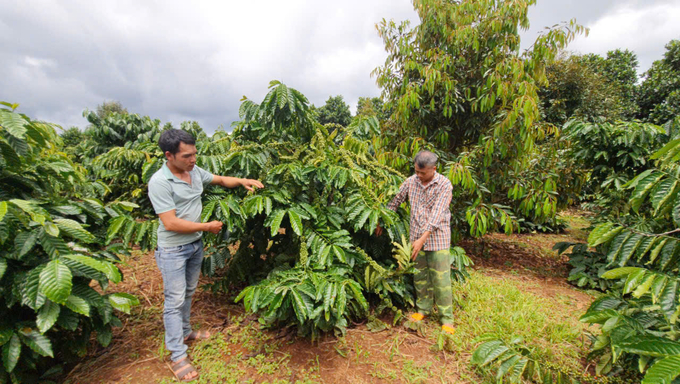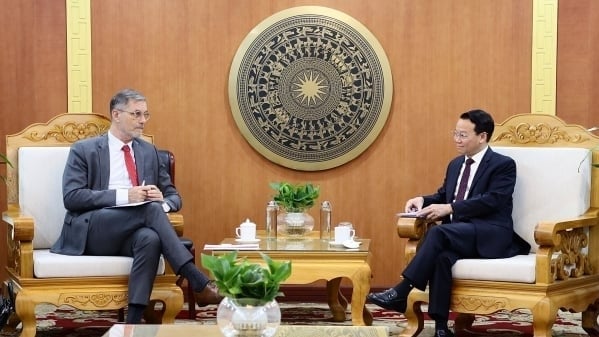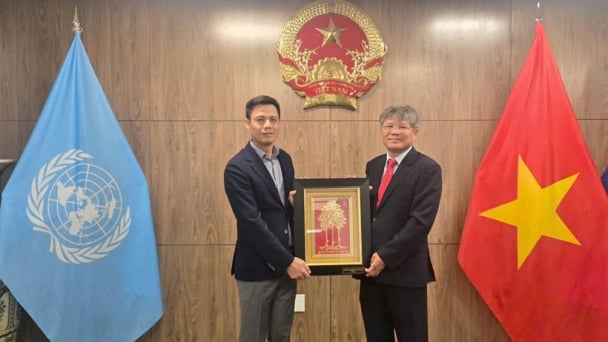May 22, 2025 | 12:12 GMT +7
May 22, 2025 | 12:12 GMT +7
Hotline: 0913.378.918
May 22, 2025 | 12:12 GMT +7
Hotline: 0913.378.918

Gia Lai is enforcing intensive cultivation for productivity, the application of scientific and technological advancements, and preventing coffee cultivation from encroaching on forest areas. Photo: Dang Lam.
Amidst the trend of coffee prices consistently staying high, Mr. Nguyen Van Hoan, Deputy Director of Gia Lai’s Department of Agriculture and Rural Development, advises farmers to maintain the current coffee acreage and avoid expanding production impulsively based on short-term market price surges.
According to him, coffee farmers in Gia Lai should focus on intensive cultivation and improving productivity through technical solutions. For aging coffee plantations, replanting requires selecting high-yield, disease-resistant varieties that have been quality certified. Additionally, farmers must enhance production quality to meet international export standards, employ surface water-saving irrigation, and limit the use of groundwater.
In response to the European Union’s proposed anti-deforestation regulations for coffee products, Mr. Hoan noted that Europe is a major export market for Vietnamese coffee. Under these new regulations, coffee grown on deforested land will not meet export conditions.
Thus, in the future, localities will need to strengthen forest protection efforts and prevent deforestation for coffee cultivation. According to Mr. Hoan, Gia Lai province will implement a project to identify coffee-growing areas to assess whether any of them lie within deforested regions.
Coffee is a key crop in Gia Lai province, with a total area of over 105,000 hectares, spread across 10 districts and cities. The main areas are Chu Se, Dak Doa, Ia Grai, Chu Prong, among others. Of this, nearly 60,000 hectares of coffee are produced following standards such as VietGAP, 4C, RA, FLO, and C.A.F.E.
Translated by Kieu Chi
![Reducing emissions from rice fields: [3] New values generated from carbon credit](https://t.ex-cdn.com/nongnghiepmoitruong.vn/608w/files/content/2025/05/19/dsc09613-144700_71-150957.jpg)
(VAN) In addition to helping safeguard the environment, the low-emission rice cultivation model also generates new opportunities for farmers by leveraging the carbon credit market.
![Ho Chi Minh city adapts to climate change: [1] Vulnerable in the whirlwind of development](https://t.ex-cdn.com/nongnghiepmoitruong.vn/608w/files/duyenht92/2025/05/19/3131-ngap-nongnghiep-163121.jpg)
(VAN) As the country's economic engine with a rapid urbanization rate, Ho Chi Minh city is facing increasingly serious consequences of climate change.

(VAN) On May 21, Minister of Agriculture and Environment Do Duc Duy worked with Mr. Olivier Brochet, Ambassador Extraordinary and Plenipotentiary of the French Republic to Vietnam.

(VAN) VRG recently conducted a visit and working trip to the United States to demonstrate its efforts in redefining the role of rubber enterprises in the global value chain.

(VAN) In 2024, over 295 million people across 53 countries and territories faced acute hunger—an increase of almost 14 million people compared to 2023, while the number of people facing catastrophic levels of hunger reached a record high.

(VAN) World Environment Day 2025 (June 5) carries the theme 'Beat Plastic Pollution' continuing to emphasize the global urgency of addressing the plastic waste crisis.

(VAN) This was the assessment shared by experts at the workshop titled 'Assessing the Role and Potential of Low-Emission Rice Production Systems in Vietnam,' held on the morning of May 19.